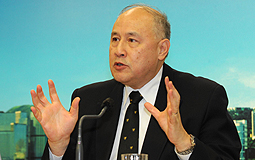
|
| Legal action: Anthony Neoh explains the Law Reform Commission's proposal to introduce a mechanism for multi-party litigation in Hong Kong. |
The Law Reform Commission is seeking views on its proposal to introduce a mechanism for multi-party litigation in Hong Kong.
The commission's Class Actions Sub-committee Chairman Anthony Neoh today said a comprehensive regime for multi-party litigation will enhance access to justice and provide an efficient, well-defined and workable mechanism.
The need for such a mechanism will most typically arise when a large number of people have been adversely affected by another's conduct, but each individual's loss is too small to make undertaking individual litigation economically viable.
Current situation
Under the current law in Hong Kong, the sole machinery for dealing with multi-party cases is a rule on representative proceedings under the Rules of the High Court which was criticised as restrictive and inadequate by the Chief Justice's Working Party on Civil Justice Reform in its final report in 2004.
Some jurisdictions have adopted a procedure known as a "class action", which enables the claims of a number of people against the same defendant to be determined in a single court action.
In a class action a representative plaintiff sues on behalf of themselves and all others who have a claim in respect of the same (or a similar) alleged wrong, and whose claims raise the same questions of law or fact.
Class action
To filter out cases that are clearly not suitable, the sub-committee suggested class action cases be allowed to continue only as collective proceedings if they have been certified by the court.
The new regime should be introduced first in the Court of First Instance and its extension to the District Court should be deferred for at least five years until sufficient experience is accumulated through establishing a body of case law on the new procedures.
If the regime is eventually extended to the District Court, its judges should be given the power to transfer complex cases to the Court of First Instance.
Opt-in, opt-out
The sub-committee also recommended the new class action regime should adopt an "opt-out" approach. Once the court certifies a case is suitable for a class action, any member of the class, as defined in the order of court, will be automatically bound by the subsequent litigation, unless he "opts out" of the class action within the time limits prescribed by the court order.
Where the proceedings involve parties from outside Hong Kong, an "opt-in" procedure should be the default position, with a discretion given to the court to adopt an "opt-out" procedure if the particular circumstances of the case warrant it.
Other recommendations
The sub-committee also makes recommendations in respect of a number of issues arising from the use of a class action regime:
* whether a class action regime, and in particular whether an "opt-out" version of such a regime, is appropriate for public law litigation in Hong Kong;
* whether there should be and if so, the type of procedural safeguards which should be put in place to avoid abuse of the process of the court and to ensure those put at risk of litigation should be fairly protected;
* whether there should be and if so, what safeguards should be put in place in respect of class actions involving parties from other jurisdictions where problems such as forum shopping and duplication of proceedings may arise; and,
* what funding models which allow plaintiffs with limited funds to take proceedings should be adopted.
"In the short term we think new class action proceedings in Hong Kong should apply initially only to sectors where there are already funding mechanisms in place. Our general intention is to take a step-by-step approach, leading to the establishment of a general class actions fund in the long term," Mr Neoh said.
The consultation will last until February 4. For the consultation document click here.
|